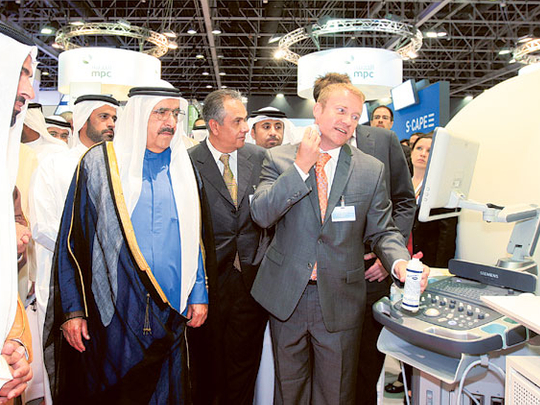
Dubai: Expansion is the buzzword for the UAE healthcare industry to meet the increasing healthcare needs as life expectancy grows, population rises, awareness increases and technology advances. The country is also striving to lower the prevalence of diabetes and hypertension — both risk factors for cardiovascular disease.
To manage the current and future healthcare demands from nationals and residents as well as medical tourists, the capacity of medical and allied health services and specialities in the country will expand. Several new projects are underway.
Against this backdrop, Arab Health, the Middle East’s largest healthcare event was inaugurated on Monday at the Dubai International Convention and Exhibition Centre by Shaikh Hamdan Bin Rashid Al Maktoum, Deputy Ruler of Dubai, Minister of Finance and President of the Dubai Health Authority (DHA).
Arab Health 2013 has brought together more than 80,000 medical and healthcare professionals as well as thousands of global healthcare companies and conference delegates. This year marks the event’s 38th edition.
The MENA region’s healthcare market is one of the most sought after global markets for healthcare investment. In this, Arab Health is well placed to be a cross-industry platform for leading global healthcare companies, hospitals, medical providers and potential consumers.
The Dubai Chamber of Commerce and Industry estimated that the UAE healthcare market is expected to grow from Dh11.7 billion in 2005 to Dh43.7 billion in 2015.
According to Deloitte, an international firm providing audit, financial advisory, tax and consulting services, the total healthcare spending in the UAE will nearly double by 2014, raising the sector’s contribution to GDP from 2.8 per cent to 3.4 percent.
Further pushing healthcare spend are increased investments by government and international investors and Dubai’s medical tourism initiative.
Speaking to Gulf News, Engineer Eisa Al Maidoor, Director-General of the Dubai Health Authority (DHA), said that the authority is in the process of identifying gaps in services, building capacity and increasing investors, “We expect a steady increase in healthcare requirements. Within the DHA network of health centres and hospitals, we have increased capacity by about 12 per cent. We are looking into different parameters to ensure sustainable growth,” he said.
The DHA is working on a strategy that will outline growth for the healthcare centre based on the Dubai Strategic Plan 2015, which envisions sustainable economic growth and social development.
“The strategy will be released soon,” said Engineer Al Maidoor.
Marwan Abedin, Chief Executive Officer, Dubai Healthcare City (DHCC) told Gulf News said that Mediclinic City Hospital expansion project, valued at Dh200 million, is underway. The project is expected to be ready by early 2015.
He spoke of the need for continued capacity building and medical education to support sustainable growth.
On the role of Arab Health 2013, Abedin said, “Historically Arab Health has been an important part of the UAE healthcare industry, providing a platform for the Dubai Healthcare City to engage with stakeholders and regional players in healthcare. Our focus area is medical tourism and how DHCC can help develop this along with other partners.”












